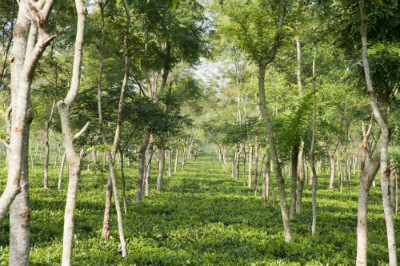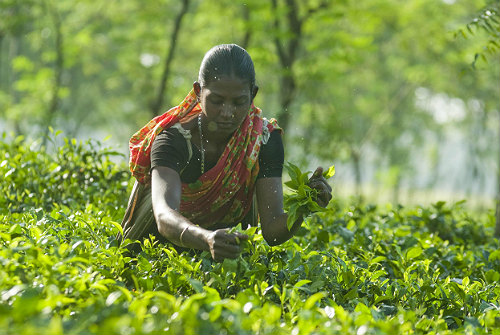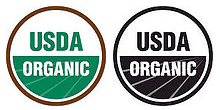From packaged tea to fresh produce to frozen dinners, there are a growing number of organic food options available to consumers these days. But what exactly is organic and why do we care?
Organic has holistic origins.
"In 1939, the term ‘organic farming’ [was coined] out of [the] conception of ‘the farm as organism’ to describe a holistic, ecologically balanced approach to farming." – Wikipedia
The modern organic movement was born in the early twentieth century in response to agricultural damage the industrial revolution’s introduction of synthetic chemicals had caused, including erosion, soil depletion and a decline in crop varieties.
The organic practices that emerged focused on traditional farming methods—used for thousands of years before chemicals were introduced—to conserve and improve soil. Improved soil conditions, it was thought, would provide a sustainable agriculture solution that would yield better tasting and more nutritious food.



Organic helps conserve and protect the environment.
"Organic food is produced by farmers who emphasize the use of renewable resources and the conservation of soil and water to enhance environmental quality for future generations." – United States Department of Agriculture (USDA)
The synthetic pesticides and chemicals used in conventional growing methods are transferred into groundwater and can pollute water in nearby streams, rivers and lakes. They can also leach soil nutrients, destroy soil structure and leave the ground vulnerable to erosion.
But organic practices that feed and protect plants and soil with natural and renewable resources—such as manure, compost, plant cuttings and mulch—can improve the soil’s ability to retain nutrients and improve soil structure over time, creating an ecosystem that is healthy and sustainable for the long-term.
Organic is free of synthetic pesticides and chemicals.
"Organic food is produced without using most conventional pesticides; fertilizers made with synthetic ingredients or sewage sludge; bioengineering; or ionizing radiation." –USDA
Conventional, non-organic growers manage pests and disease using synthetic pesticides and feed plants with chemical fertilizers. These pesticides and chemicals leave residue on (and in) a plant that those working with the plant may be exposed to and that may be ingested when the plant is consumed.
The USDA claims that an organic plant carries significantly fewer pesticide residues than does a conventional plant. That’s because organic growers feed plants and soil with natural fertilizers—such as manure or compost—and use natural pesticides and beneficial insects to help manage pests and disease.
Organic tastes better.
"Because they're not protected by pesticides, organic plants that suffer from insect attack can accumulate higher level of flavor chemicals and other protective molecules, including antioxidants." – Harold McGee, Food Scientist
Better taste is a certainly a subjective matter. But here are some of the theories that support why many claim organic foods taste better:
- The aroma and flavor of a plant come from phytochemicals the plant stores up to protect itself from invaders like microbes and insects. Organic plants that are not protected by pesticides tend to build up higher levels of these flavor-producing phytochemicals in order to defend themselves against their natural predators.
- Organic plants are often allowed to blossom and ripen at their own natural pace, instead of being sped to harvest with chemical feed, so they have time to develop more of their natural sugars and other chemical compounds which contribute to the plant’s final flavor.
- Organic crops benefit from soil that is higher in nutrients, so plants are better nourished and fed.
Organic is a certified process.
"Before a product can be labeled ‘organic,’ a Government-approved certifier inspects the farm where the food is grown to make sure the farmer is following all the rules necessary to meet USDA organic standards. Companies that handle or process organic food before it gets to your local supermarket or restaurant must be certified, too." –USDA
Not just anyone can slap an organic label on a product and call it good. The USDA established a government-regulated organic certification program that defines how foods must be grown and processed if they are to be labeled organic. The certification process is time consuming and the certification standards are rigorous.
This process assures consumers that when they buy something labeled organic they’re buying a product free of toxic chemicals and the company they’re buying from supports farming methods that benefit the environment.
Organic labels can guide you.
"The term "organic" may only be used on labels and in labeling of raw or processed agricultural products, including ingredients, that have been produced and handled in accordance with [USDA] regulations." – USDA
To be sure you're buying certified organic, look for one of these USDA seals on a product’s label:

Products can only display these seals if they meet USDA organic certification standards. In conjunction with the USDA organic seal, a product may also be labeled "100 Percent Organic" if all ingredients are certified organic, or "Organic" if the product contains at least 95 percent certified organic ingredients.
Anything labeled "Made with Organic Ingredients" must contain 70 to 94 percent organic ingredients and may not display the USDA organic seal. Any product with less than 70 percent organic ingredients does not qualify for an organic label and may only use the word organic within its ingredients list to identify which ingredients are organic.
Organic is an investment.
"Prices of organic foods include not only the cost of the food production itself, but also a range of other factors that are not captured in the price of conventional food." – Food and Agriculture Organization of the United Nations
It’s true that some organic products cost more at the grocery store than their conventional counterparts. The investment a farmer makes to become USDA certified organic is just a small part of that cost. Here are some of the other factors that account for the higher prices on organic products:
- Organic farms are typically smaller and cannot compete with the production yields and economies-of-scale that conventional farmers enjoy.
- Organic farms are labor intensive and cost more to manage and maintain.
- Since organic farmers don’t use synthetic pesticides or chemical preservatives, organic yields can be smaller or spoil more quickly than conventional yields.
- Organic farmers do not receive government subsidies like large-scale conventional farmers do, so the price of organic reflects the actual cost of growing.
- The negative effects of conventional farming—like the cost of environmental clean up of polluted water runoff or the cost of health risks associated with workers handling toxic pesticides—are not taken into account in the cost of conventional food products.
Organic fits with Teatulia®'s mission.
"Organic production is not simply the avoidance of conventional chemical inputs, nor is it the substitution of natural inputs for synthetic ones. Organic farmers apply techniques first used thousands of years ago, such as crop rotations and the use of composted animal manures and green manure crops, in ways that are economically sustainable in today's world." – USDA
Teatulia's mission is to sustain the land and the people while producing top-quality tea. So it just makes sense that we are a USDA-certified organic tea garden.
By using natural farming practices that don’t harm the environment, we’ve created a diverse and thriving ecosystem that is highly sustainable and provides a bright future for the Bangladeshi men and women who help cultivate our exquisite teas.
Learn why organic makes a better tea. https://www.teatulia.com/tea-101/why-drink-tea/why-organic-tea.htm
Learn more about Teatulia’s sustainable practices and cultivation techniques. https://www.teatulia.com/sustainable-practices.htm
Sources:
USDA - Organic Production and Organic Food: Information Access Tools, June 2007
Mayo Clinic - Organic foods: Are they safer? More nutritious?
Organic Trade Association - Measurable Effects of Pesticides on the Environment
Organic Trade Association - Organic Agriculture and Production
USDA - Organic 101: Five Steps to Organic Certification, October 10, 2012
WebMD - Safer Food For a Healthier You
Beyond Pesticides - Eating with a Conscience
Center for American Progress - It's Easy Being Green: Organic vs. Conventional Foods—The Gloves Come Off, September 10, 2008
Electronic Code of Federal Regulations - Title 7: Agriculture, Part 205—National Organic Program, as of January 24, 2013
New York Times - Organic, and Tastier: The Rat's Nose Knows by Harold McGee, October 3, 2007
Lucky Peach Magazine - Handling Herbs by Harold McGee, Issue 3, Spring 2012
Food and Agriculture Organization of the United Nations - Organic Agriculture FAQ
Wikipedia - Organic Food
Kerr Center for Sustainable Agriculture - A Brief Overview of the History and Philosophy of Organic Agriculture by George Kuepper, 2010

